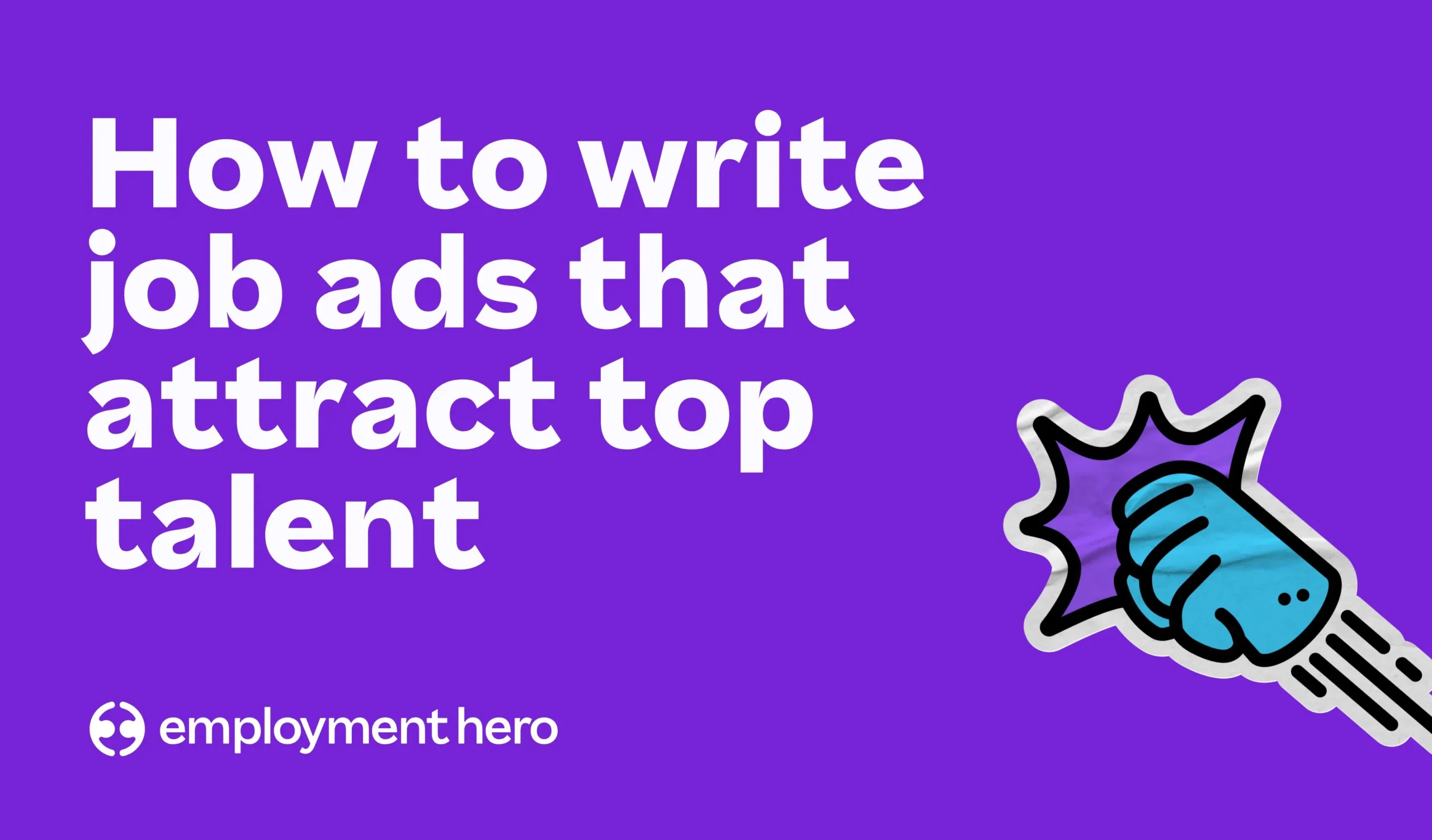AI For Small Businesses: Time For Leaders To Embrace It?
The key to unlocking success – how AI can empower small business leaders.

Contents
Imagine a world where robots perform everyday tasks, computers can learn and make decisions. Machines can outsmart humans and have taken over the role of running society, from the courts to education, government to healthcare. While this may sound like science fiction, or a nightmare for some, the truth is that it’s quickly becoming our reality. For our upcoming AI HR report, we’ve reached out to 300 businesses across Australia, New Zealand, UK,Malaysia and Singapore to find out exactly how they’re adapting to AI. Small business leaders friends – if you’re not already familiar with it, now is the time to get involved. Because the acceleration of artificial intelligence (AI) has radically transformed the business landscape. No longer the realm of Big Tech, now small business leaders can be at the forefront of whatever comes next. AI has the capabilities to reshape how small businesses operate, opening up new opportunities and possibilities. That’s why understanding AI and embracing it with business smarts is a game-changer for small business success. So buckle up. We are about to dive deep on AI. We’ll explore the benefits and challenges of AI adoption specifically that small businesses are more likely to encounter. By examining real-life success stories, addressing common misconceptions, and discussing ethical considerations, we aim to provide our small business leaders with the insights and guidance needed to make informed decisions about integrating AI into their operations. The future is here already – are you ready?

Understanding AI – a no-nonsense guide for small businesses
AI refers to the development of computer systems capable of performing tasks that typically require human intelligence, such as perception, learning, problem-solving, and decision-making. AI is a field of research covering systems that encompass a range of technology methods, including machine learning, natural language processing, computer vision, and robotics. So when we’re talking about ChatGPT, or Bard, what we’re really talking about are language models built on machine learning. Generative AI uses deep learning algorithms to generate human-like text based on a given prompt. In the business realm, AI has numerous applications that can benefit small businesses. AI-powered chatbots and virtual assistants can handle your customer inquiries and support like a breeze, freeing up human resources while also providing round-the-clock service. AI algorithms can also crunch through tonnes of data, providing valuable insights that help you make smart decisions and craft killer strategies. Oh, and did we mention that AI can automate boring tasks like data entry or inventory management? That means less time on mind-numbing stuff and more time on what really matters! The key is to understand the real deal about AI in business, like how it can supercharge your efficiency, cut costs, and give you the brainpower to make smarter decisions. By being smart about it, you can ride the AI wave and enjoy the advantages it brings to the table. Is it time to embrace the power of AI and take your small business to the next level? Let’s see if we can’t win you over with the benefits.
Benefits of AI adoption for small businesses
There’s no doubt about it, embracing AI can help you supercharge your game as a leader. There are so many benefits that can help you speed on towards success – here’s our top five:
1. Streamlined operations
Leverage AI applications to automate repetitive tasks like creating job descriptions or management notes, freeing up time for you and your employees to focus on important strategic and creative activities. By automating processes, AI can enhance efficiency, reduce human error, and speed up operations. This efficiency boost allows small businesses to accomplish more in less time and allocate resources to higher-value tasks.
2. Cost savings
AI applications can save costs by reducing headcount where you don’t need it – for example using chatbots to handle customer inquiries instead of hiring a large customer service team. But that’s not all. AI algorithms can use sentiment analysis to analyse trends such as in customer reviews, enabling you to pick up on areas for improvement early, and Recommender System tools like AWS Personalise allow you to offer tailored recommendations, offers, and marketing campaigns to your customers. This personalised touch can strengthen customer relationships and boost satisfaction. Another good use of AI applications is to optimise inventory management to reduce waste and ensure optimal stock levels.
3. Slick decision-making
By leveraging AI analytics applications, businesses can gain valuable insights from data, enabling more informed and data-driven decision-making. AI is able to process and analyse large amounts of data quickly and accurately, providing valuable insights and enabling data-driven decisions that lead to better outcomes. Some might even say it can analyse data, spot opportunities and make better decisions than a real person. Food for thought, hey?
4. Competitive edge
Once upon a time (and by that we mean last year), AI was really only available to use by Big Tech. Today, AI is accessible to anyone with an internet connection. In this way AI empowers small businesses to compete with larger corporations by leveraging AI for market research, predictive analytics, and automated processes, helping you stand out in your industry. Now is the time to embrace it.
5. Scale and grow
When you take a step back and look at the bigger picture, it’s pretty clear. The degree to which AI applications can automate processes and improve efficiency allows you to handle larger workloads without a significant increase in workforce – if you choose to. This scalability empowers your business to expand and grow in ways that were simply not accessible or affordable before. But don’t just jump on the bandwagon. It’s always wise to remember that the specific benefits of AI adoption may vary based on your industry and business model. We’re listening to our customers and taking every precaution to ensure the AI tech we use in our platform fits the needs of small business owners like you. But we still advise you to balance your needs, goals, and objectives to determine how AI can align best with your small business, rather than just signing up for the latest technology.

And of course, there are drawbacks, challenges, and valid fears surrounding AI implementation. So let’s take a quick look at the dark side, and what it might mean for you.
The challenges of AI adoption for small businesses
While there are plenty of opportunities that AI can bring to an organisation, let’s not overlook the challenges that small businesses face when it comes to adopting and embracing AI. We don’t want these to be a barrier where they don’t have to be – and the first step to overcoming barriers is to talk about them.
Budget constraints
Small businesses often operate with limited financial resources, making AI implementation seem costly. Acquiring AI technologies, hiring skilled personnel, and maintaining infrastructure can require substantial investments. Luckily, there are tons of cost-effective AI solutions around such as cloud-based platforms, open source applications, and even beta tests for AI service providers. Talk to others in your industry about what works for them, and always research before you buy.
Lack of technical expertise
It’s no secret that AI demands expertise in data science, machine learning, and AI algorithms, and these experts attract eye watering salaries. Small businesses may face challenges in finding and affording skilled professionals who can develop and maintain AI systems. However, these days it doesn’t have to be so difficult to access expertise. There are heaps of alternative options like using AI-powered tools and platforms, partnering with AI development companies that offer services specifically designed for small businesses, outsourcing AI development, and upskilling existing employees through training programmes. All of these can help you neatly get round the issue of not having deep AI knowledge expertise in-house.
Resistance to change
This next challenge is a big one, particularly for SMEs. Implementing AI may encounter resistance from employees who fear job displacement or lack familiarity with AI technologies. This isn’t about luddites – the technology is moving fast and tech literacy isn’t keeping up. Overcoming this challenge requires transparent communication and involving your employees in the adoption and implementation process. The key is to focus on how AI can enhance employees’ work rather than replace them. While AI may automate certain tasks, it also creates new roles and opportunities. That’s why it’s so critical to involve employees in the AI adoption process. Providing training opportunities and demonstrating tangible benefits can alleviate resistance and foster a positive AI culture. Facing a lot of resistance lately? Check out the Guide to Change Management.

Complexity of implementation
Small businesses may assume that AI is only accessible to large corporations with ample resources. However, there are AI tools and platforms specifically designed for small businesses that are budget-friendly as well as user-friendly. So, no need to stress about being a tech giant to embrace AI!
Ethical and compliance considerations
Some leaders may be confused about the legal position when it comes to AI adoption – just look at the number of countries that have banned ChatGPT, and the open letters from experts to governments demanding a pause in the development of generative AI. Like any rapidly advancing technology, AI adoption raises ethical and legal concerns that small businesses must address. Leaders should be aware of the risks of ‘digital colonialism’ when choosing to adopt AI, and ensure transparency, fairness, and privacy protection in all AI systems used. Small businesses also need to understand and comply with relevant regulations and industry standards. Adopting ethics guidelines, conducting regular audits, and implementing robust data security measures can help mitigate ethical and legal risks. Keen to see how it works in practice? Read on for two businesses embracing AI to keep their customers happy…
Success stories: small businesses thriving with AI
Cruise Planners
AI facial recognition has been in use for some time to speed up boarding and enhance security on cruise ships. But Cruise Planners go a few steps further into the future. They’re a leading cruise travel agency using AI to recommend cruises that are a good fit for their customers’ interests and budgets. The AI system is trained on a massive dataset of customer data, including past cruise bookings, travel preferences, and budget information. When a customer visits Cruise Planners’ website, their AI system analyses their data and recommends a list of cruises that are likely to be a good fit for them. The system is constantly being updated with new data, which helps to ensure that it is always recommending the best possible cruises to customers. Cruise Planners’ use of AI has been very successful. The AI system has helped to increase the number of cruises that customers book, and it has also helped to improve the customer experience. Customers appreciate the convenience of having the AI system recommend cruises that are a good fit for their interests and budgets.
Toast
Toast is a restaurant technology company that uses AI to help its customers improve their operations. Toast’s AI-powered solutions include: tools for managing inventory, scheduling staff, and processing payments, saving their customers time and money while also helping them to deliver better customer service. Besides an AI-powered inventory management system that can help restaurants to reduce food waste by automatically ordering supplies when needed, Toast has also recently partnered with SoundHound AI Inc. to add voice ordering over the phone to its point-of-sale system. This enables restaurants using Toast’s system to accept voice orders over the phone and transmit the order directly to Toast’s platform. Handy, tasty, smart – win, win, win. These are just a few examples of how small businesses can use AI to improve operations.

Key AI applications relevant to small businesses
By leveraging AI, you can save substantial time and money, improve efficiency, and provide better customer service. So before we wrap up, let’s look at some specific examples of AI applications that might benefit your business.
Customer service
Using AI to automate customer service tasks is a no brainer. Tasks that are resource-intensive like answering questions, providing support, and resolving simple issues can easily be done tech, freeing up employees to focus on more complex tasks. Of course, being able to provide round-the-clock support can also help improve customer satisfaction. Let your staff do more rewarding tasks while an AI chatbot answers frequently asked questions about your products or services.
Marketing and sales
Running low on creative juice? There’s an app for that. Generative AI applications like Bard or ChatGPT can be used to create marketing strategies, create content and personalise marketing campaigns, targeting messages to specific customers based on their interests and demographics. When you’re able to pinpoint your customers interests and needs more specifically, this can have a profound impact on your conversion rates – which is exactly what Cruise Planners found as we mentioned above. Wondering how it can help your sales team? Well, when they’re up against some tricky objections or gnarly leads, your sales representatives can use generative AI applications to help navigate sales conversations to a successful outcome. Don’t thank me – thank Bard…
Operations
AI can be used throughout your business to automate a range of tasks – everything from scheduling appointments, to managing inventory, to tracking finances. This can help you and your team save time and money, and also improve accuracy and efficiency. These tools can use data such as availability, location, inventory levels and even trends and preferences to optimise (and even automate) decision-making.
HR
We know HR is about humans, but that doesn’t mean you can’t get a helping hand from AI. AI applications definitely have a role to play in the employee life cycle – from recruitment tasks like sourcing candidates and parsing CVs, to onboarding, performance management and reward and recognition. Generative AI is set to revolutionise HR – have you seen all the ways we’re using it already in our platform? Work just got even easier.
Automation and AI is here – let’s embrace it.
So, you’ve seen how AI can be a powerful tool for small businesses. By leveraging technology, as a small business you can streamline many different areas of operations to support you to grow and scale your business. Stand out from your competition, hire top talent, and now it’s so much more accessible and affordable, you’ll even be able to stand strong alongside much larger businesses. We want our customers to get the most out of our platform. Whether it’s HR, payroll or benefits, everything we do is designed to make your world at work easier. If you’d like to stay up to date with all of our content, you can visit our resource hub or follow us on LinkedIn.
Related Resources
-
 Read more: Product Update: June 2025
Read more: Product Update: June 2025Product Update: June 2025
Follow our June 2025 product update as we share all of the latest and greatest features we’ve released over the…
-
 Read more: The ‘work-life balance’ trap: Why promising it is hurting your SME recruitment (and what to promise instead)
Read more: The ‘work-life balance’ trap: Why promising it is hurting your SME recruitment (and what to promise instead)The ‘work-life balance’ trap: Why promising it is hurting your SME recruitment (and what to promise instead)
For growing SMEs, work-life integration is a sustainable way to support your team and attract top talent. Explore how your…
-
 Read more: Job ad guide: How to attract top candidates
Read more: Job ad guide: How to attract top candidatesJob ad guide: How to attract top candidates
Looking to hire your perfect match? The way you pitch your open role can be the difference between landing or…




















